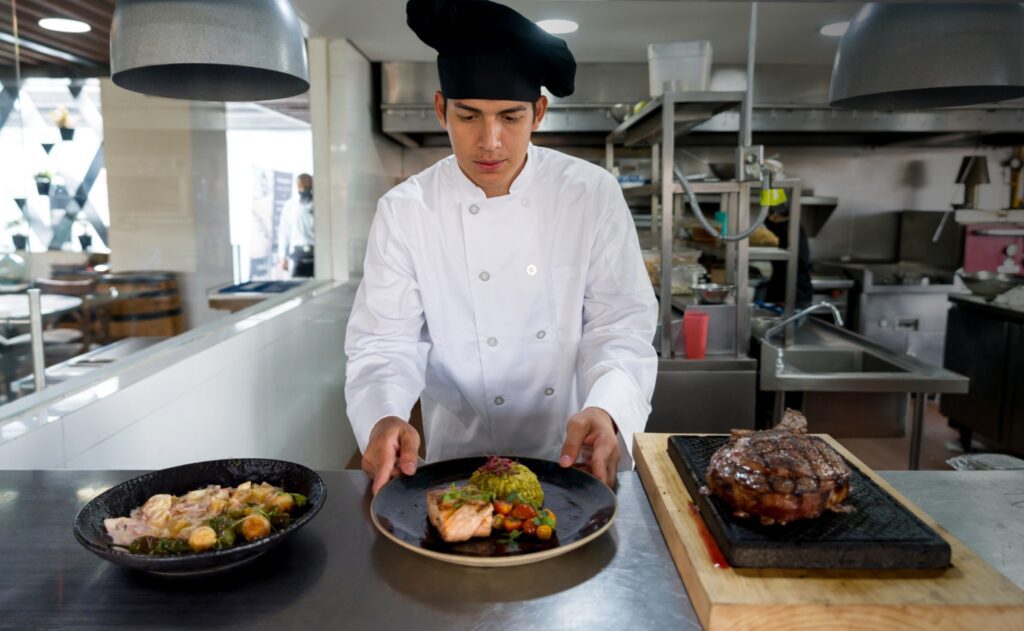knowledge is power.

what not to say
in an interview
Nail your interview by avoiding these common mistakes.


What Not
To Say
Nail your interview by avoiding these common mistakes.
Everything you say during a job interview helps a hiring manager decide if you’re the right fit for the position. For those critical minutes, you’ve got to make an impression—and it better be a good one. Success can be as much about what you don’t say as what you do say, so here are eight things to avoid.
1. “So sorry I’m late!”
This isn’t a date, so a cute smile won’t cut it. When you show up late for a job interview, it’s a clear sign that you have poor time management skills, and it’s a sure way to make a bad impression before you meet your interviewer. Be on time, which really means be 10 minutes early.
2. “My last boss was awful.”
It doesn’t matter if you formerly reported to Darth Vader—it’s never a good idea to speak badly about a former employer. No matter how reasonable your complaints may seem, you’ll come across as gossipy or even whiny. The interviewer will likely assume you’d trash them in a similar fashion.
3. “I’m really nervous.”
Depending on your interviewer, it may not make you feel any less nervous to announce it. If you’re worried about seeming nervous, just say you’re really excited about the opportunity.
4. “That’s on my resume.”
Thanks, Captain Obvious! The interviewer will have already checked your resume, but now they want to hear how you talk about your previous experience. Let your communication skills shine as you make your resume points come to life.
5. “Um, so, like …”
Get it together. Filler words like these make you sound unprofessional. Practice what you’re going to say out loud before your meeting so you’re not searching for words during the actual interview.
6. “I don’t have any questions for you.”
Having questions for your interviewer is just as important as smartly answering the ones they ask you. Use the time to show that you’re as engaged as you say you are. The interviewer will expect it.
7. “Could you hold on for a second?”
If texting or answering calls during an interview doesn’t get you kicked out of the room immediately, it should. Turn your phone off before the meeting and give the interviewer your undivided attention.
8. “How much time will I have off?”
Nothing says slacker like asking about paid time off before you’ve even started. If you mention time off during the interview, you’ll likely leave the impression that you don’t even want to be there.
Your No. 1 goal during an interview is to demonstrate why you’re the best person for the job. Mind your manners, be polite, do your homework, and keep your eyes on the prize. If you do, you’ll be on your way to landing the job.
It’s a sure bet that bar owner David Bowen and restaurant co-founder and Executive Chef Kevin Cottrell know how to interview. Learn how these pros made their way to the top.

goals. job.
find the match.
Get a good idea by matching your personality traits and professional goals to the right job.


Is a Career in
Hospitality
Your Jam?
Get a good idea by matching your personality traits and professional goals to the right job.
Hospitality is one of the hottest sectors for jobs in the state, which means that individuals looking for a full-time career or part-time gig in restaurants and hotels have a lot of opportunity to explore. If you’ve got customer service skills, the ability to multitask like a boss, and thrive in fast-paced environments, this industry can be a great fit.
Let’s get personal
Hospitality is all about service. From entry-level positions (cashiers, cooks, and housekeepers) to more advanced management roles (executive chefs and hotel managers), there are many rewarding options to consider.
For front of house positions (wait staff, hotel reception, concierge, hostess), you’re working directly with the public. If you’re back of house (dishwasher, valet, night auditor), you’re behind the scenes. Regardless of position, to succeed in the industry, you’ll need a basic set of soft skills—personality traits that can indicate how you’re likely to work with others.
Soft skills many employers look for include:
• Communication
• Problem-solving
• Self-motivation
• Dependability
• Teamwork
Define your goals
When you’re considering the right employment path, think about what you want to achieve:
- Do you want a long-term career, a part-time gig, or a seasonal job?
- Do you need a flexible schedule?
- Do you want to work with people, or do you prefer to keep to yourself?
- What experience do you have, and how will it apply to the job you’re considering?
For example, if you’re interested in hotel management, a housekeeping position would be a great entry point. Hotel housekeepers are essential employees, working behind the scenes to ensure that guests are comfortable and that the premises are clean. If you have strong organizational and leadership skills, your job could advance from attending rooms to managing the department in just a few years.
Or, maybe you’re a foodie with aspirations of becoming a chef or an executive chef. These roles keep a kitchen running like a well-oiled machine. They create new recipes, work with vendors, and hire the kitchen staff. Find a job as an entry-level line cook and work your way through the kitchen to sous chef, senior chef, and chef. To succeed in these roles, you’ll need cooking skills, organizational skills, and attention to detail.
One more thing to consider: Hotels and restaurants are businesses, so their success also depends on operational efficiencies. As such, the industry also needs all levels of staff across traditional business areas, such as human resources, finance, and marketing.
Search for your next career move today.



do you need school to work in hospitality?
How to decide which type of education is the right fit for you


Traditional University or Trade School?
How to decide which type of education is the right fit for you
Working in the hospitality industry doesn’t require a formal education. While some individuals have had professional training, others started with entry-level positions and worked their way to the top of their organizations with on-the-job training.
But there’s no one-size-fits-all path. (Check out David Bowen’s story to see what we mean.) Carving out a career in the hospitality industry is as complex as it is diverse. And while you could find your way in through numerous entry points, often a solid foundation in the form of a certification, a diploma, or a degree can be the key that opens the door to a successful long-term career.
Understanding the differences between trade schools and traditional universities may help you decide which is the right fit for you.
Trade schools
Trade school programs can usually be completed in two years or less. This educational track takes a streamlined approach by focusing on the specific training needed for your field, without mixing in any general education courses. The cost of attending a trade school is a fraction of the cost of a traditional university.
The admissions process for trade schools is streamlined compared to college admissions. The only prerequisite for most trade schools is a high school diploma or equivalent. No SAT scores, recommendations, or essays are necessary.
A certificate or diploma from a trade school can help you find a job in a particular field in the hospitality industry.
Colleges and universities
Colleges provide a well-rounded education. The first half of an undergraduate degree program generally requires courses in history, math, science, and English. The courses in the second half target the specific degree you’re working toward.
A college degree may be required for candidates looking for a more specialized career in hospitality management.
Experience over formal education
If the world of academia just isn’t for you, start your hospitality career with an entry-level position on your chosen career path. Real-world, on-the-job experience will give you a good sense of the demands of the hospitality industry and help you develop the skills you’ll need to succeed, such as:
- Attention to detail
- Patience
- Professionalism
- Multitasking
- Positivity
Teamwork is also crucial to success. Whether you’re working at a hotel front desk, in a busy kitchen, or as part of a housekeeping staff, you’ll need to be able to work well with others.
Getting a great start on a hospitality career journey can begin with choosing the education path that’s the right fit for you.
Search for your next career move today.

big brands vs. boutique: which job is right for you?
How to choose the right type of business for your career path


Independent or Corporate?
How to choose the right type of business for your career path
North Carolina’s hotels and restaurants represent a dynamic list of businesses. Some are national corporations with thousands of employees. Others are small, independent establishments with only a few dozen workers. If you’re considering a long-term career in hospitality, you’ll need to decide whether a corporate or an independent company is the right fit for you.
A good way to begin is by assessing the pros and cons of each option.
Independent companies
Smaller, independent operations may offer more hours, but those hours will likely come with fewer benefits and maybe even slightly lower pay compared with the pay larger establishments might offer. However, the biggest pro might be the opportunity for promotion. For example, as part of a smaller team, you may be able to work your way up from line cook to lead line cook in a year or two.
That smaller team also tends to be more close-knit, with a feeling of camaraderie and family among co-workers. You’ll likely have more freedom to gain experience in different areas of the operation.
Corporate brands
One of the benefits of working for a corporation is consistency. If you’re asked to work a shift at a different location, the systems and processes will be the same, making it easier for you to jump in, be productive, and get your work done.
Working as part of a larger team at a bigger place could mean it takes longer to advance in the organization, but there can be more training opportunities and more room to grow in a corporate setting.
In larger hotel and restaurant chains where there’s a big demand for talent, job seekers can usually expect highly competitive compensation and benefits packages. There’s also generally more flexibility when it comes to sick days and last-minute getaways because there are more employees available to fill in for an absent co-worker.
Hospitality skills
Whether you choose the independent or corporate path, you’ll need the right hospitality skills, such as attention to detail, patience, teamwork, and flexibility, to help you succeed.
Each path in hospitality is unique, and choosing to work for either an independent organization or a corporate chain is just one of many decisions you’ll need to consider. The great news is that there are so many opportunities available in North Carolina’s hotels and restaurants that you can create a career that suits your professional and personal aspirations. And if those change, that’s OK. There’s another opportunity just around the corner.
Search for your next career move today.



Sushi chef to golf caddie: Go Nontraditional
If you can think it, you can do it. Here’s a look at some of the most interesting niche jobs in the industry.


Sushi chef to golf caddie: Nontraditional hospitality careers
If you can think it, you can do it. Here’s a look at some of the most interesting niche jobs in the industry.
If it seems that new hospitality jobs pop up on the regular, there’s a reason. The nature of hospitality is service, so taking care of customers means staying in step with their ever-changing demands. (This might explain why some hotels employ a dog surfing instructor or why others have their very own beekeeper.)
Of course, our industry can’t create a job to match the pie-in-the-sky whim of every guest, but plenty of trends in food, activities, and self-care have prompted new job titles. Here’s a roundup of some of the nontraditional hospitality roles you might want to consider for your career.
On a roll: Sushi chef
Our love of sushi isn’t exactly new—Americans have been gobbling it up since the 1960s, and today there are nearly 20,000 sushi restaurants in operation in the U.S. alone. But when you consider your culinary career, sushi chef may not be on your radar. However, if you like the idea of creating new combinations of fish, fruits, and veggies, your new role could be creating new rolls.
At your room service: Hotel butler
Sure, everyone’s familiar with the concierge. They’re who we consult about things to do outside the hotel, like restaurant recommendations, directions to a must-see attraction, or the name of a great place to grab a cocktail.
But it’s the hotel butler who might just be your new best friend. Butlers take care of the guest experience inside the room. This role is usually found at luxury hotels where guests request help with unpacking, ironing, special menu items, and the like.
Foam sweet foam: Head brewer
If you’re a beer person, then this job’s for you. This role leads the restaurant’s beer production, handling all of the details around sourcing ingredients and materials, finding recipes, and keeping everyone on schedule. There’s plenty of taste testing, too.
Dig in: Massage therapist
It just doesn’t feel the same when you massage your own shoulders. This is why massage therapists are in demand at hotel spas all over the world. These pros promote relaxation and pain relief for guests booking 30-, 60-, and 90-minute appointments.
Organized fun: Event planner
The event planner takes care of business and special events happening at the hotel, restaurant or venue. If you like multitasking, talking with clients and vendors, and coordinating myriad details without a hitch, event planning could be on your agenda.
Go clubbing: Golf caddie
Golf is one of the most popular sports in the U.S., which is one of the reasons caddies are in demand. If you love to be outdoors, know the game, and can handle holding a bit of weight (golf bags with clubs can weigh about 35 pounds), then consider helping out a favorite (or high-tipping) golfer.
Search for your next career move today.
Find a Job


